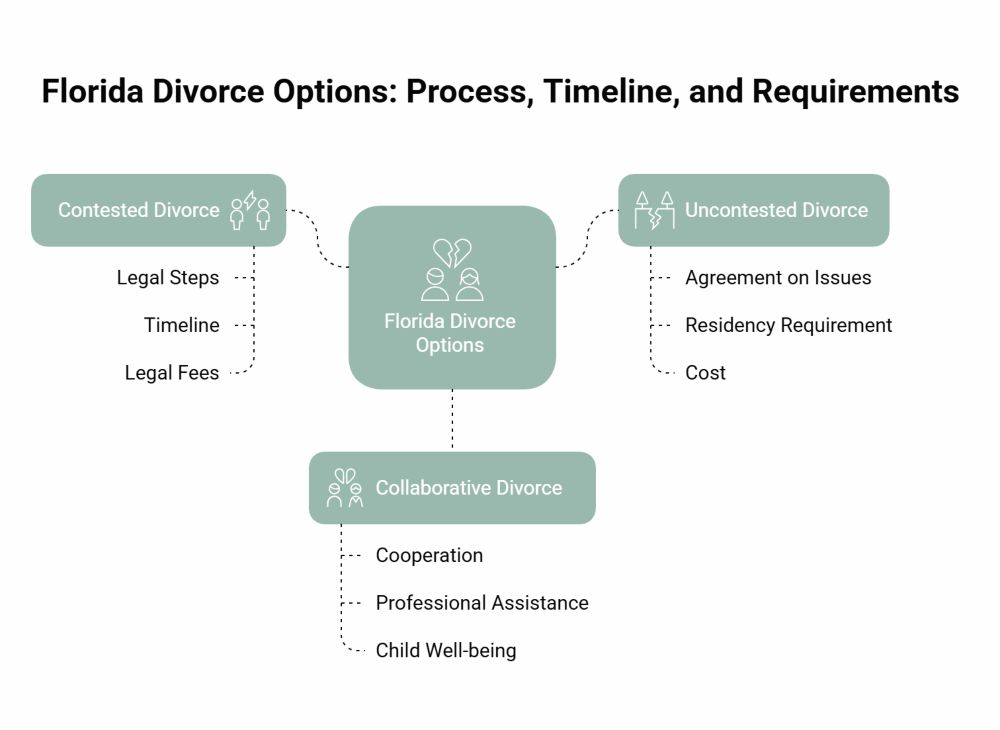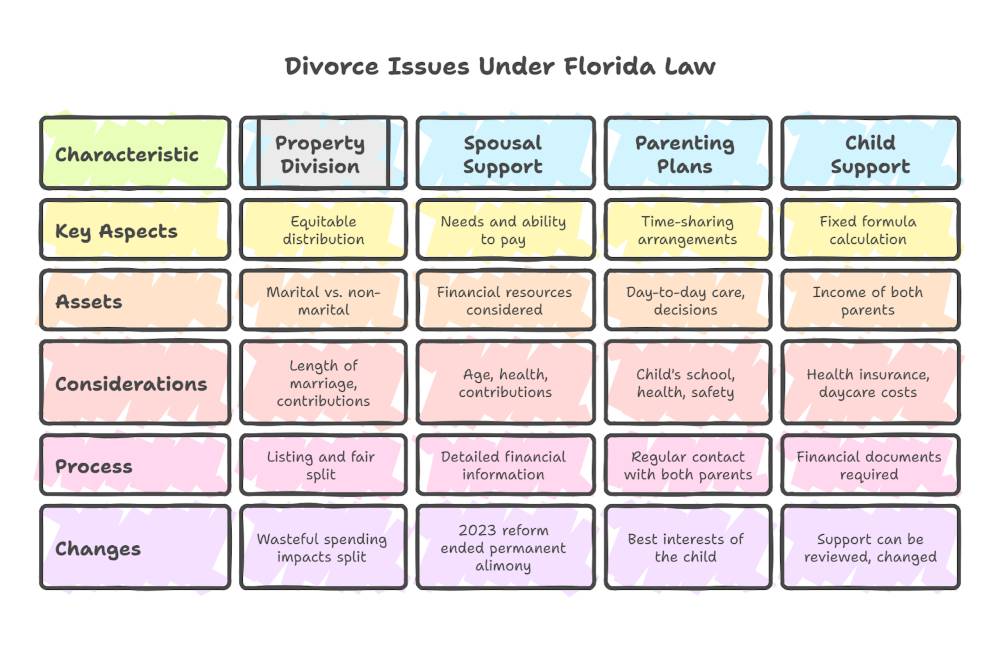Florida Divorce Law: What Every Couple Should Know Before Filing in 2025
Originally published: June 2025 | Reviewed by Carol Ann Mazza

Divorce is never simple, but understanding the basics of Florida divorce law can help couples make more informed decisions during a challenging time.
Florida is a no-fault divorce state, which means either spouse can file for divorce without proving that the other was at fault.
Understanding the process, from dividing assets to determining parenting plans, is crucial to protecting your interests and beginning the next chapter as smoothly as possible.
Many people have heard common myths about divorce in Florida, like thinking one spouse always gets everything or that the process has to be expensive and drawn out.
In reality, there are several legal paths to divorce, including contested, uncontested, and collaborative divorce, each with its specific requirements and benefits.
Couples need to understand the facts so they can select the option that best suits their situation.
Key Takeaways
- Florida allows for both fault-based and no-fault divorces, providing couples with flexibility.
- Different legal options and required paperwork exist for separating couples.
- Being informed helps manage costs, emotions, and expectations.
The Legal Framework For Divorce In Florida

In Florida, couples must meet specific legal requirements before initiating the divorce process.
The state follows set guidelines for who can file, where to file, and which forms to use.
Florida Is A “No-Fault” Divorce State
Florida law does not require either person to prove who caused the marriage to fail.
Instead, couples can file based on the marriage being “irretrievably broken.”
This makes divorce filings less stressful since neither spouse has to prove wrongdoing like adultery or abuse.
The only recognized legal grounds are the irretrievable breakdown of the marriage or, in rare cases, mental incapacity.
These no-fault rules are the same across the state and apply regardless of where someone is filing, from Miami to Tallahassee or Broward County.
Residency Requirements And Jurisdiction
To file for divorce in Florida, at least one spouse must have lived in the state for the six months right before filing.
Proof of residency might include a Florida driver’s license, a state ID, or a voter registration card.
If neither person meets this rule, the court will not accept the case. Jurisdiction is based on where the person lives, not on where they got married.
This means that a couple married outside of Florida can file if they now meet the residency requirement.
Where To File And What Forms Are Required
Divorce cases are filed in the circuit court of the county where either spouse lives.
For example, couples living in or near Fort Lauderdale would file in the Broward County Circuit Court.
It is essential to check local rules, as each county may have minor differences in the process.
Checklist for Filing Divorce:
- Complete the correct Petition for Dissolution of Marriage form
- Provide financial affidavits
- File for child custody or support, if needed
- Pay all court fees, which can vary by county
Many counties, such as Broward, offer online forms and step-by-step help for the Florida divorce process.
Extra paperwork may be needed if children or property are involved. This step-by-step guide can help couples stay organized during the process.
Florida Divorce Options: Contested, Uncontested, And Collaborative

Couples in Florida can choose between different divorce options, depending on how much they agree or disagree on important issues.
The main paths include contested, uncontested, and collaborative divorces, each with its own process, timeline, and requirements.
Contested Divorce Process And Timeline
A contested divorce occurs when spouses cannot agree on major issues, such as child custody, property division, or spousal support (also known as alimony). One spouse files a petition with the court.
The other party must respond, often leading to several legal steps, including discovery, mediation, and, in some cases, a trial.
The process typically takes from several months to over a year, depending on the complexity of the issues at dispute.
Both parties may need to attend multiple court hearings. Legal fees can become significant, as contested divorces often involve hiring attorneys and gathering evidence.
The court will make final decisions on unresolved matters.
Those going through this process should understand that it can be stressful and time-consuming, especially if children are involved.
Uncontested Divorce In Florida
In an uncontested divorce, both spouses agree on all issues, such as how to divide property, child support, and alimony. This type often moves much more quickly and smoothly than a contested divorce.
Key requirements for an uncontested divorce in Florida include:
- Both parties must agree on all major issues.
- At least one spouse has lived in Florida for six months or more.
- All required paperwork is completed and signed.
Uncontested divorces typically cost less, ranging from $500 to $5,000, and can be finalized in as little as 4–12 weeks.
Court appearances are rare. This choice is ideal for couples who can work together to settle their differences.
Collaborative Divorce: A Smoother Alternative
A collaborative divorce enables couples to resolve their issues privately with the assistance of professionals, such as lawyers, financial advisors, and mental health specialists.
Under Florida collaborative divorce law, this process focuses on cooperation and respectful communication.
Both sides typically meet outside of court. Legal battles are avoided, and all parties agree not to go to trial.
Instead, they use negotiation and teamwork to resolve issues related to property, support, or parenting.
This method is beneficial for families who want to avoid the stress and exposure of a public court fight.
Collaborative divorce can also protect children’s well-being by reducing conflict and focusing on positive solutions.
Considering divorce? Carolann Mazza at CollaborativeNow helps couples avoid court with calm, respectful, and collaborative resolutions. Begin your collaborative divorce journey—contact us today.
If you’re ready to get started, call us now!
Key Divorce Issues Under Florida Law

Divorcing couples in Florida face important questions about how their property, finances, and parenting responsibilities will be managed.
Each area of law has its own rules and regulations that can significantly impact the outcome.
Property Division – Equitable Distribution
Florida divorce law employs a process known as equitable distribution to divide assets and debts.
Marital assets include property, income, and debts that the couple acquired while married.
Non-marital assets, such as inheritances or property owned before the marriage, typically remain with the original owner.
The court starts by listing all property and debts. Then, a judge tries to split them fairly, though not always equally.
Judges consider factors such as the length of the marriage, each person’s contributions, and the economic circumstances of both parties.
Business interests, retirement accounts, and even pets may be part of the division process.
If either spouse intentionally spent or wasted assets, the court may award more to the other spouse.
Spousal Support (Alimony) – 2023 Reform Explained
Florida changed its alimony laws in 2023, ending permanent alimony awards.
Now, courts focus on the needs of the spouse asking for support and the other spouse’s ability to pay.
Alimony can be awarded for a temporary period or for a specified duration, depending on the length of the marriage and other relevant factors.
There are various types of alimony, including bridge-the-gap, rehabilitative, durational, and lump-sum. Each type has its own rules for when it can be used.
Judges consider each spouse’s age, health, financial resources, and their contributions during the marriage.
Spousal support is not automatic in Florida. Both partners must give detailed financial information as part of the process.
Parenting Plans And Time-Sharing
Instead of using the term “custody,” Florida refers to parenting plans and time-sharing arrangements.
Parents must file a detailed parenting plan that explains how they will handle day-to-day care, shared decisions, and schedules with their children.
The court wants children to have regular and continuing contact with both parents unless it would harm the child.
Time-sharing schedules can be flexible or fixed, but must focus on the best interests of the child.
Judges will consider factors such as the child’s school, health, and the ability of each parent to provide a safe and loving environment.
Child Support Calculations
Florida law uses a fixed formula to figure out child support payments.
The amount depends on the incomes of both parents, the number of children, and the time each parent spends with the children.
Additional costs, such as health insurance, daycare, and special needs, may also be included.
Both parents are required to give financial documents. The goal is to make sure children’s needs are met fairly. If a parent’s income changes, child support can be reviewed and changed.
The formula is explained in state guidelines, helping parents know what to expect and reducing conflict.
Financial Documents And Disclosure Requirements
In Florida, divorcing couples need to share detailed financial information.
This process helps the court divide property, debts, and assets fairly.
Mandatory Financial Affidavits
Each spouse must complete a financial affidavit and give it to the other person. This document lists income, expenses, assets, and debts.
Common items include recent pay stubs, tax returns for the past three years, bank account statements, and deeds to real estate properties. The parties must certify that all information is complete and accurate.
Documents such as W-2s, 1099s, credit card statements, and retirement account balances should also be submitted.
These disclosures are governed by Florida Family Law Rule 12.285, which makes the process automatic without needing a special request.
If someone fails to provide a full financial disclosure, it can delay the divorce process or result in court penalties. Both spouses should keep copies of everything they submit.
Required Documents Table
| Document Type | Examples |
| Income | Pay stubs, tax returns, W-2s |
| Assets | Bank statements, deeds, stocks |
| Debts | Credit card & loan statements |
| Retirement Accounts | 401(k), IRA, pension summaries |
Handling Retirement, Pensions, And Debts
Divorce in Florida requires couples to identify and share information about all retirement accounts, pensions, and debts. This includes 401(k)s, IRAs, pensions, and any other retirement savings the couple owns.
Even accounts earned before marriage may need to be reported. The court will examine which parts of the retirement accounts were acquired during the marriage.
Only that portion is usually divided, unless the spouses agree otherwise. Both spouses should gather recent account statements and any details about employer contributions.
Debts are also important. This includes mortgages, car loans, and credit cards.
The court considers who used the debt and for what purpose. Sometimes, debts are split equally; at other times, one spouse may be responsible for a greater share.
If any debt is joint, both people remain responsible for it even after the divorce.
Create a parenting plan that protects your child and avoids conflict. Carolann Mazza at CollaborativeNow can help—schedule your consultation now.
If you’re ready to get started, call us now!
Choosing The Right Divorce Process: Mediation Vs. Court
Couples in Florida have options for resolving their divorce, each with important differences. Understanding these choices can help them make the best decision for their family, finances, and future.
Pros Of Divorce Mediation In Florida
Divorce mediation in Florida provides couples with an opportunity to resolve their disagreements outside of court, with the assistance of a neutral mediator.
Mediation is usually less expensive than traditional court because it uses fewer lawyer hours and avoids lengthy hearings.
Sessions are private, and the process can move more quickly. Couples control the timeline and decisions, making the experience less stressful.
Mediation encourages open communication and cooperation, which is especially helpful for parents who will continue to co-parent after the divorce.
Most Florida divorces are settled without going to trial, showing that mediation is a popular and effective choice.
It’s also a good choice for couples who are willing to compromise and want to avoid the public record of courtroom proceedings.
Benefits of Mediation:
- Usually faster and more affordable
- Private and confidential process
- Flexible scheduling
- Couples retain more control over the outcome
- Can reduce conflict and stress, especially for families
When Litigation May Be Necessary
Although mediation works for many, some families find that the court is a more suitable option. Litigation may be needed if there is a history of domestic violence, child safety concerns, or a strong power imbalance.
In these cases, a judge will ensure that each person’s rights are protected. Litigation is also necessary when one or both spouses refuse to cooperate or fail to disclose important financial information.
Complex situations, such as those involving high-value assets or fiercely contested child custody, may require formal court orders and evidentiary hearings.
A judge will make the final decisions during litigation, which may bring closure when couples cannot agree on important issues.
Some prefer litigation for its clear structure and enforceable results, even though it can be expensive and time-consuming.
Legal Representation And Unbundled Services
Understanding how legal help works in a Florida divorce can save couples time, money, and stress. Some couples will require full legal support, while others may use lawyers only for specific aspects of the process.
Do You Need A Lawyer To File For Divorce In Florida?
People in Florida can legally file for divorce on their own without a lawyer. This is referred to as “pro se” representation.
The state provides forms online, making the process more accessible for those with simple cases, few assets, or no children. However, divorce can become complicated when there are disagreements about property, support, custody, or other issues.
Even if a couple agrees on everything, paperwork must be done correctly. Mistakes can delay the case or result in unfair outcomes.
Many families choose to at least consult a lawyer for guidance. Florida courts also allow “unbundled services.”
This means an attorney can assist with specific tasks, such as reviewing forms or preparing for a hearing, rather than handling the entire case. Unbundled services can reduce costs and give couples more control.
Choosing The Right Divorce Attorney In Florida
Choosing the right attorney depends on the specific needs of the case and the couple’s budget. Some want a full-service lawyer who will manage all details, while others prefer legal help only for tough spots.
Couples with significant assets, substantial debts, or multiple children often require more comprehensive legal support.
When picking a divorce attorney, look at experience in Florida family law, cost, and the attorney’s style.
Many lawyers offer complimentary initial consultations to discuss the case. Ask questions like:
- What are your fees?
- How do you communicate about progress?
- Have you handled cases like mine before?
Some attorneys offer collaborative law, which helps couples agree without going to court. Reviewing several options can help each person find the most suitable support for their specific situation.
Timeline, Costs, And What To Expect Emotionally
The divorce process in Florida follows a specific timeline that couples should be aware of before initiating proceedings. Costs can vary a lot depending on the route taken and can become a source of stress.
Beyond legal steps and financial planning, the emotional experience of divorce can be challenging and deserves care.
How Long Does Divorce Take In Florida?
Divorces in Florida can proceed quickly or take several months, depending on whether they are uncontested or contested.
If both parties reach an agreement on key issues, an uncontested divorce can be finalized in as little as four to six weeks after filing.
There is a required 20-day waiting period from the date the petition is filed before the court will enter a final judgment. For contested divorces, when spouses cannot agree, time frames are much longer.
These cases may involve mediation, multiple hearings, and can last for six months or even more than a year.
Prepare for potential delays due to court backlogs or if either party requests additional time for financial disclosure or child custody proceedings.
Cost Ranges Based On Process
Costs for divorce in Florida depend heavily on whether the divorce is uncontested or contested. At a minimum, filing fees are around $408.
An uncontested divorce, where couples agree on issues, usually costs less, often just the court fees and a few hundred dollars for paperwork or mediation, if required. When divorces are contested, legal fees rise sharply.
Attorney costs, depositions, and extra paperwork can add up quickly. It’s not uncommon for contested divorce costs to range from $2,500 up to $15,000 or more if the case goes to trial.
Mediation typically costs less than full litigation and can help lower worry and expense.
Key expenses: Court filing fees
- Attorney fees
- Mediation costs
- Service fees
Managing The Emotional Side Of Divorce
Divorce is often described as one of the most stressful life events. Feelings of anxiety, sadness, and anger are common.
The uncertainty of living arrangements, child custody, and financial changes makes it even harder. It helps to have emotional support throughout the process.
This support can come from family, friends, or counseling. Children may also require additional support to cope with changes in their family.
Maintaining open communication and establishing healthy routines provide much-needed stability. Florida couples can benefit from community resources and support groups.
Emotional wellness is as important as legal and financial steps. Reaching out early, consulting with professionals, and prioritizing self-care can make the transition smoother.
Final Judgment And Post-Divorce Considerations
Once a Florida divorce is finalized, the court issues a binding order that dissolves the marriage and sets out important terms. Even after the divorce, there can be more steps to work through, especially for couples with children.
What Happens After The Divorce Is Final?
When the judge signs the final judgment, the marriage is legally ended. This document outlines the terms of child custody, child support, alimony, and the division of property.
In most cases, a final judgment cannot be given until at least 20 days after the divorce petition is filed. If both parties agree on all issues, the final judgment typically aligns with their decisions.
If they do not agree, the judge decides based on the evidence shared in court. After it is entered, each person must comply with the terms of the order; otherwise, they may face legal consequences.
Some changes cannot be made without court approval. For example, child support, visitation, or spousal support may be modified if there is a major change in circumstances.
All property transfers must also be completed in the specified order.
Typical contents of a Florida final judgment:
- Child custody and visitation
- Child support and alimony
- Division of property and debts
Post-Divorce Mediation For Co-Parenting Issues
Co-parenting can raise concerns even after a divorce is finalized. Problems with schedules, communication, or major decisions for the children may still happen.
Post-divorce mediation offers parents a safe space to resolve their disagreements.
A mediator helps guide the discussion, but ultimately, the parents make their own decisions.
Florida courts may even require mediation in some cases before parents take their conflict back to a judge.
Mediation can address issues such as:
- Changes to holiday or summer schedules
- Disagreements about medical or school choices
- Communication and information sharing
Choosing mediation is often faster and less costly than going back to court.
Don’t let court battles decide your future. Resolve your divorce peacefully with mediation from CollaborativeNow—get in touch today.
Contact Us Today For An Appointment
Frequently Asked Questions
How long do you have to live in Florida before filing for divorce?
To file for divorce in Florida, at least one spouse must have lived in the state for six months before filing. Residency can be proven with a driver’s license, lease agreement, or other documentation. This rule is outlined in Florida Statutes § 61.021.
What are the grounds for divorce in Florida?
Florida is a no-fault divorce state, meaning the only grounds required are that the marriage is “irretrievably broken.” Neither spouse needs to prove wrongdoing, like adultery or abuse. This simplifies the legal process and reduces courtroom conflict.
What is the difference between uncontested and contested divorce in Florida?
An uncontested divorce means that both spouses agree on all terms, whereas a contested divorce involves disagreements that require court intervention. Uncontested cases are typically faster and less expensive, often resolving in months, whereas contested divorces can take over a year to complete.
What is a collaborative divorce in Florida?
A collaborative divorce is a no-court process in which both spouses work with trained professionals to reach a mutually agreeable settlement. The couple signs an agreement not to litigate and instead resolve all issues with the help of attorneys, coaches, and financial experts.
How is property divided in a Florida divorce?
Florida follows an equitable distribution approach, which means marital assets are divided fairly, rather than equally. Courts consider the length of the marriage, financial contributions, and individual needs when determining what’s fair. Non-marital assets are typically excluded from division.
Is permanent alimony still allowed in Florida?
No, permanent alimony was eliminated in Florida in 2023, effective with the passage of Senate Bill 1416. Judges may now award bridge-the-gap, rehabilitative, or durational alimony based on the length of the marriage and the parties’ financial needs.
Do you need a lawyer to get divorced in Florida?
You’re not legally required to hire a lawyer, but it’s highly recommended—especially if you have children, property, or disagreements. Florida courts allow self-representation, but legal guidance can help avoid mistakes and costly delays.
